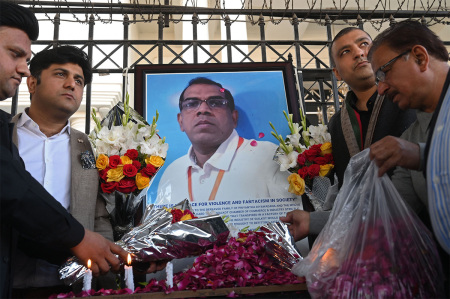Pakistan: 6 men get death penalty for mob killing over 'blasphemy' claim

A court in Pakistan has sentenced six people to death for beating a Sri Lankan man to death and burning his body over allegations of blasphemy last December.
The Anti-Terrorism Court in Lahore, Punjab province, also gave life sentences to nine people, five years’ imprisonment to one, and two-year sentences to 72 people who were part of the mob, the Qatari-government run Al Jazeera reported, adding that eight of those sentenced were juveniles.
The late Priyantha Kumara Diyawadana was a Sri Lankan factory manager at a sports equipment factory in Sialkot when he was accused by workers of committing blasphemy. He was 48 when he was murdered last December.
“We are against the death penalty. However, in this case, there had to be a precedent [set] against vigilantism and mob violence,” the national project coordinator at the Catholic bishops’ National Commission for Justice and Peace was quoted as saying by UCA News. It was the right thing to do. We are looking forward to verdicts in similar cases.”
Video clips shared on social media last December showed a mob, allegedly supporters of an Islamic party, beating the Sri Lankan man and setting his body ablaze. Some men in the mob took selfies with the burning corpse in the background.
“Mr. Kumara allegedly tore a poster of the hardline Tehreek-e-Labbaik Pakistan in which Quranic verses were inscribed and threw it in the dustbin,” an anonymous official was quoted as saying by the Press Trust of India at the time.
“The poster of the Islamist party was pasted on the wall adjoining the office of Kumara. A couple of factory workers saw him removing the poster and spread the word in the factory,” the official said, adding that most of the people in the mob were activists and supporters of the TLP.
“The mob dragged the suspect (the Sri Lankan national) from the factory and severely tortured him. After he succumbed to his wounds, the mob burn[ed] his body before police reached there,” he said.
The Pakistani Prime Minister at the time, Imran Khan, had called it a “day of shame for Pakistan.”
“The horrific vigilante attack on factory in Sialkot & the burning alive of Sri Lankan manager is a day of shame for Pakistan,” he tweeted after the lynching. “I am overseeing the investigations & let there be no mistake all those responsible will be punished with full severity of the law. Arrests are in progress.”
Nasir Saeed of the U.K.-based Centre for Legal Aid Assistance and Settlement had blamed the government’s “inaction” on previous cases of mob violence and the blasphemy laws.
“Neither is this the first case of public lynching nor is it going to be the last unless the government and politicians take this matter seriously and make appropriate changes to the law,” Saeed said in a statement, calling the incident one of the “worst examples of how people are misusing the blasphemy law.”
The blasphemy law, embedded in Sections 295 and 298 of the Pakistan Penal Code, is frequently misused for personal revenge. It carries no provision to punish a false accuser or a false witness.
The law is also used by Islamist extremists to target religious minorities — Christians, Shi’as, Ahmadiyyas and Hindus.
The world’s attention was drawn to Pakistan’s blasphemy law after Asia Bibi, a Christian mother of five, was sentenced to death and served over 10 years in prison before Pakistan’s Supreme Court acquitted her in 2018. Her acquittal drew the ire of radical extremist groups as many protested in the streets and threatened to kill the Supreme Court judges responsible.
In 2014, Christian couple Shehzad and Shamah Masih were burned to death in a brick kiln over false accusations that they had ripped pages from the Quran.





















